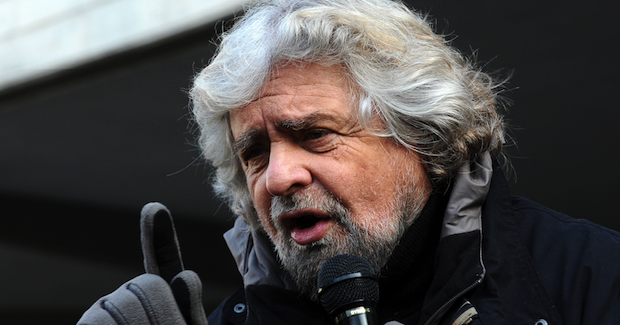Grillo’s Unlikely Push against Euroscepticism

With an unexpected and ultimately unsuccessful initiative on 8 January, the founder and charismatic leader of Italy’s 5-Star Movement, Beppe Grillo, launched a primary vote on his eponymous blog to decide on the 5SM group’s membership in the European Parliament. The move seems to be a precursor to a wholesale repositioning of the party’s EU stance.
More than 40,000 members of Grillo’s digital platform Rousseau cast their votes on 8 and 9 January. Nearly 80 per cent expressed a preference for the 17 5-Star Movement (5SM) Euro-parliamentarians to join the centrist pro-EU integration Alliance of Liberals and Democrats of Europe (ALDE), led by former Belgian prime minister Guy Verhofstadt.
After the last European elections in June 2014, the 5SM controversially joined forces with Nigel Farage’s UKIP to form a fiercely Eurosceptic parliamentary group named Europe of Freedom and Direct Democracy (EFDD).
The nature and timing of the 5SM digital primary vote caught both activists and pundits unaware. Contrary to the 5SM’s signature claims of grassroots politics, Beppe Grillo’s sudden move was essentially a top-down initiative pursued in secrecy. As the digital vote was launched on the blog without any prior debate, the 5SM base was thus presented with little more than a rubber stamp procedure of a decision already taken by the leader and his inner circle.
Upon the vote’s launch, Beppe Grillo explained in a straightforward blog post that in this post-Brexit EU, time was up for the 5SM’s alliance with the UKIP. With Farage quitting the party’s leadership, Grillo claimed that the 20 British Euro-parliamentarians would only focus on maximising the exit outcomes of their country. Grillo also highlighted that in the past two and a half years the 5SM and UKIP voted together in less than 20 per cent of the total European Parliament resolutions. Hence, Grillo’s stated reason for divorcing from the UKIP is simply to improve the 5SM’s prospects of constructive work in EU matters.
For the same reason, Grillo strongly discouraged blog members from voting for the third option of going solo, as this would mean having very limited voice and access to parliamentary work and resources.
Grillo revealed that he had also approached the European Greens group, but they refused the alliance with the 5SM in order to preserve their existing group balance. Other reasons for the Greens’ turndown include the Eurosceptic stance previously expressed by 5SM and also the dubious proprietary relationship of the movement with Beppe Grillo’s blog—which is owned by the media consulting company, Casaleggio Associati, established by the late 5SM’s cofounder, Gianroberto Casaleggio.
After this rebuff, Grillo advocated the alliance with ALDE on the basis of an agreement with Verhofstadt, ensuring that the 5SM would retain complete autonomy in parliamentary resolutions, while joining forces in the fight against the excessive bureaucratisation and lack of effective democratic representation in the EU institutions. With the 5SM, ALDE would become the third largest group in the European Parliament and get a real chance to steer the future direction of the EU.
Verhofstadt’s initial role in this initiative is also surprising, but only to a point, considering that he is campaigning hard to gather support to replace Martin Schulz as the president of the European Parliament—chiefly against two Italian opponents from the centre-right European People’s Party (Antonio Tajani) and the Party of European Socialists (Gianni Pittella).
In another surprising and rapid turn of events, on 9 January the very evening that the 5SM’s base approved the new alliance, the ALDE’s main powerbrokers stopped Verhofstadt’s and Grillo’s odd partnership, in particular led by the centrist Francois Bayrou of the French Mouvement Democrate. In response Verhofstadt had to quickly release a statement to explain that: “There is insufficient common ground to proceed with the request of the Five Star Movement to join the ALDE Group. There remain fundamental differences on key European issues. However, on issues of shared interest, such as the environment, transparency and direct democracy, the ALDE Group and the Five Star Movement will continue to work closely together.”
Consequently, on January 10 Grillo and Davide Casaleggio, the late cofounder Gianroberto’s son and heir, had to appease Nigel Farage to reenter the EFDD Group in order not to lose the funds linked to belonging to a parliamentary group. This was the second last voted option in the blog vote—albeit by only about 15 per cent of the members. In exchange, Farage successfully demanded to have the 5SM co-chair of the EFDD, David Borrelli, fired as he was the negotiator of the failed alliance with ALDE.
On the surface, this awkward turnaround made Grillo’s blog vote a useless if not politically detrimental exercise. Certainly this is creating a certain embarrassment for the 5SM leadership, as it adds fuel to both internal criticism from anti-EU and populist hardliners (though they are a minority component) and to external attacks from the pro-EU centrist and progressive Italian parties, which fear the 5SM’s encroachment into their political space.
However, it is worth considering that Grillo may be playing an audacious if expedient game of repositioning the 5SM in the centre as a reformist force open to political alliances outside, but not against, the establishment, somewhat along the lines of Ciudadanos in Spain. This is timely in preparation for the next Italian general elections, due in early 2018 or earlier should the newly appointed Gentiloni Government fail.
It could be argued that Grillo managed to convince Verhofstadt behind closed doors by dangling his 17 votes in support of the Belgian’s candidature as president of the European Parliament in exchange for a very favourable position of independence within the ALDE Group. However, the case might be that the Italian was not really counting on being accepted by the rest of the ALDE Group, which is composed by a motley crew of small centrist, liberal and progressive parties across the whole of Europe.
This argument is supported by Grillo’s indication to form a new political Euro-group called Direct Democracy Movement (DDM)—already featured in his blog post of January 8, which launched the primary vote online. This essentially signalled that either within or without the ALDE Group, the 5SM is aiming to become a reformist force for a more democratic EU outside the establishment, but not destructively against it—much like the former EFDD right wing companions of the UKIP and Alternative für Deutchland (AfD). Most likely, without the UKIP at the next European elections in 2019, the voice and strength of right-wing anti-EU populists like AfD will be significantly diminished.
The 5SM’s transformation in European politics, an E-U turn so to speak, should be welcomed and encouraged by advocates of further European integration and federalism. Those same advocates should be dismayed by the self-interested closure of ALDE’s minority components, fearful of losing influence within an expanded group. This is particularly momentous as the crucial 2017-18 rounds of general elections approach in France, Holland, Germany and Italy, as well as the European Parliament election in 2019. Grillo’s movement is well-positioned to take office in Italy and thence catalyse reformist politics towards a more democratic direction for the EU. In an era of global insecurities and regional tensions, this appears to be the best, if not the last, shot at securing the EU’s survival against resurgent nationalism.
This article was originally published on 10 January; it has been updated in light of subsequent developments.
Dr Giovanni Di Lieto lectures International Trade Law in the Bachelor of International Business program at Monash University. His research agenda focuses on international economic law, in particular the global governance of cross-border socio-economic relations and its repercussions on the international regulation of trade and labour markets.
This article is published under a Creative Commons Licence and may be republished with attribution.





